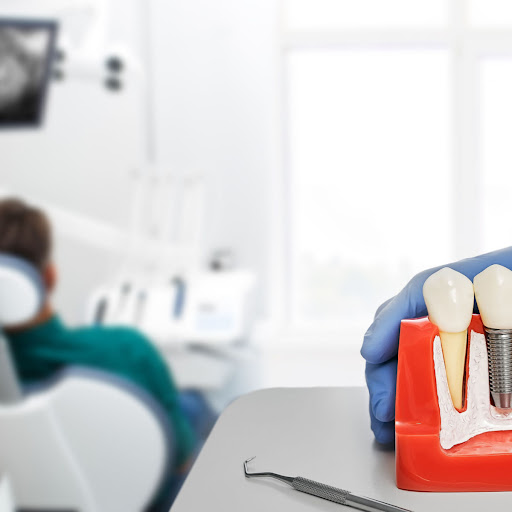
Are you missing one or more teeth, and looking for a permanent solution? At Whitlow Dental Care, led by Fresno implant dentist, Dr. Kurt Whitlow, we offer dental implants, the ideal solution for permanent tooth replacement. Dental implants can help you eat, speak, and smile your best, potentially for the rest of your life! Learn more about dental implants by calling Whitlow Dental Care at 559-441-7700 or keep reading the helpful guide below to learn more.
Dental implants are artificial tooth roots typically made of biocompatible materials like titanium. They’re surgically placed into the jawbone beneath the gums to provide a stable foundation for artificial teeth such as crowns and bridges, or dentures.
Dental implants can traditionally be broken into three parts:
Dental implants continue to reign as the gold standard for tooth replacement for many reasons, some of which include:
You may qualify for implant surgery if any of the following apply to you:


Before being approved for implant placement surgery, your Fresno implant dentist, Dr. Whitlow will perform a comprehensive oral health evaluation, including X-rays and CT scans, to assess the condition of your jawbone and gums. He’ll also discuss your goals for dental implants and determine if you’re a good candidate for the procedure.
Once we’ve determined that you’re a good candidate for dental implant solutions, your Fresno implant dentist will develop a personalized treatment plan. This plan will include the number and type of implants you need, the placement of the implants, and the estimated time frame for the procedure.
There are different types of dental implants available, each with its own advantages and disadvantages. Our Fresno dentist will help you choose the type of implant best for your individual needs.
Dental implant placement is usually performed while you’re under local anesthesia, but sedation dentistry or general anesthesia may also be used to keep you relaxed throughout the procedure. To prepare your mouth for implants, Dr. Whitlow will make a small incision in the gum tissue to expose the jawbone. A hole will then be drilled into the jawbone to create a space for the implant. The implant will then be screwed into the jawbone.
In some cases, a temporary restoration may be placed on the implant site while the implant is healing. This restoration will help protect the implant site and improve your appearance. You’ll return to Whitlow Dental Care once your implant has fully undergone osseointegration. Osseointegration is the process of the implant fusing with the jawbone. This process can take eight months to complete, and during this time, you’ll need to follow Dr. Whitlow’s advice to ensure healing goes well.
Once the implant has fused with the jawbone, our Fresno dentist will place an abutment on the implant. The permanent restoration will be attached, and your new smile will be complete.
It’s vital to care for your new dental implant solutions to ensure their lasting success. Here are some common aftercare tips provided by Dr. Whitlow:

Implant dentists do everything they can to make dental implant surgery as comfortable as possible. The procedure is done with the patient under anesthesia, and sedation dentistry options may help keep you more relaxed and add further pain-relieving benefits. Ask your implant dentist what steps they can take to ensure your dental implant surgery is a comfortable experience.
Whether dental implant solutions are covered by insurance depends on the specific insurance plan. Some insurance plans may cover a portion of the cost of dental implants, while others may not cover them at all. It’s important to check with your insurance provider to determine what’s covered under your plan.
Yes, dental implants can be an excellent solution for individuals with multiple missing teeth. Implants can support various restoration options, such as implant-supported bridges or implant-retained dentures, which provide a stable and comfortable way to replace multiple teeth or a full arch of teeth.
Dental implants have a high success rate, typically exceeding 95 percent when placed by experienced professionals and cared for properly. With good oral hygiene and regular dental check-ups, dental implants can last for decades, and in many cases, a lifetime.
Ready to transform your smile with dental implant solutions? Contact Whitlow Dental Care today at 559-441-7700 to schedule your consultation. We proudly serve the communities of Kingsburg, Madera, Muscatel, and beyond. Let us help you achieve a confident, beautiful smile that lasts a lifetime with dental implants!